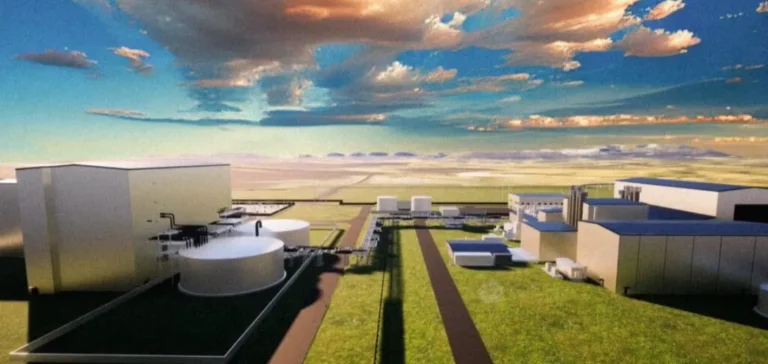TerraPower, the nuclear technology company founded by Bill Gates, has partnered with energy provider Evergy and the Kansas Department of Commerce to evaluate the deployment of a Natrium advanced reactor in the US state. A memorandum of understanding signed by the three entities outlines a joint assessment of site-specific conditions and the technical viability of the project. The goal is to identify a location that meets regulatory, technical, and community-related requirements.
A modular reactor with high storage capacity
The Natrium reactor is based on a design developed by TerraPower in collaboration with GE Vernova Hitachi Nuclear Energy. It is a 345 MWe sodium-cooled fast reactor combined with a molten salt-based energy storage system. This configuration allows output to be increased to 500 MW during periods of peak demand. TerraPower claims it is the only advanced reactor currently under development with this capability.
According to TerraPower President and Chief Executive Officer Chris Levesque, the Natrium technology combines “a next-generation reactor with utility-scale storage” designed to strengthen grid reliability. He stated that the company “is excited to advance discussions on the opportunities this solution brings to Kansas.”
A local nuclear operator involved
Evergy, the main electricity provider in eastern Kansas and western Missouri, already operates Wolf Creek, the state’s only nuclear power plant, which supplies around 17% of Kansas’s electricity. The company is now looking to diversify its generation portfolio with low-emission technologies. Chairman and Chief Executive Officer David Campbell said the agreement with TerraPower would allow Evergy to “evaluate the cost, technology, and feasibility” of deploying the Natrium advanced reactor in the state.
The partners stated that site selection will depend on local community support, the suitability of the site for licensing by the Nuclear Regulatory Commission (NRC), and access to existing infrastructure.
Multi-state deployment strategy for TerraPower
The project is part of TerraPower’s broader deployment strategy. In 2024, the company began construction of its first Natrium plant in Kemmerer, Wyoming. It also signed several strategic partnerships, including with KBR, to support international commercialisation of the technology. A joint study is underway to assess potential Natrium deployment sites in the United Kingdom.
In January, TerraPower entered into another memorandum of understanding with Sabey Data Centers to explore the siting of Natrium reactors near current and future data centres in the Rocky Mountain region and Texas. These initiatives aim to integrate advanced modular nuclear power into high-consumption energy zones.






















